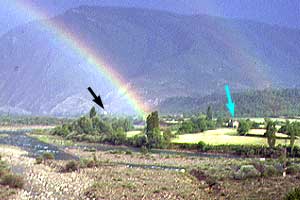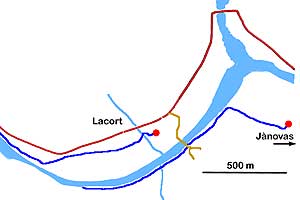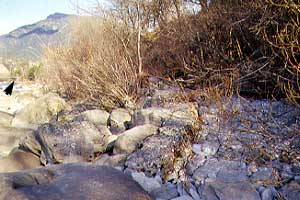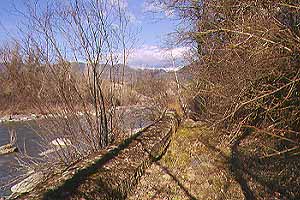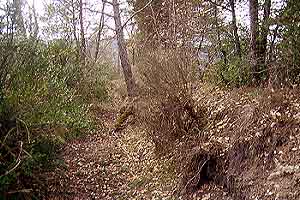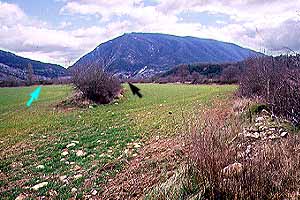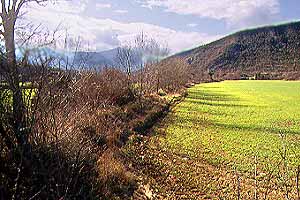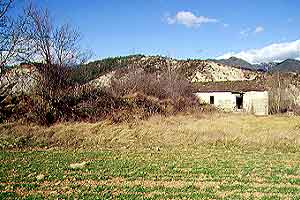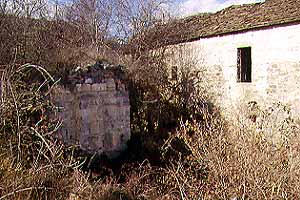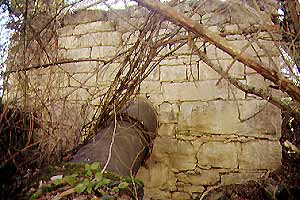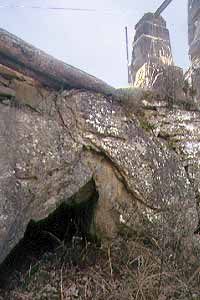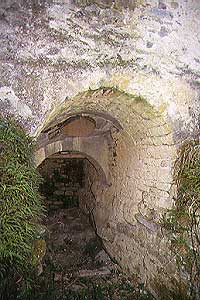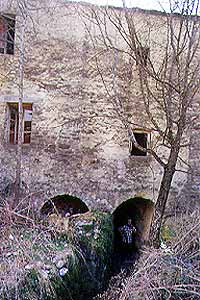Mills in Altoaragón - harinero, central eléctrica
Jánovas
Jánovas is
situated in the
Solana region between Boltaña and Fiscal on the
main road between L'Ainsa and Torla. The mill is best reached from Lacort. Coming from Boltaña you'll first
reach the panoramic viewpoint of Jánovas, then the branch
to Yeba and San Martín and after a while you'll reach a narrow turn to the right
with a (the first) house at the left. At that spot a track brings you to a suspension
bridge over the Río Ara. Drop the car. Cross the bridge and walk to the left where
you'll find the channel leading to the mill. First follow the path and then the
tree-line along the channel. It's perhaps a good a idea to try first to locate the mill
from the road (pict. 1).
The mill takes water from the Río Ara.
Pictures: 1.III.2007 and 11.IV.2007
The molino of Jánovas has no
pond to keep an amount of water to bridge dry periods. Water is fed directly from
the canal to the turbine. This is a feature in common with most mills along the
Río Ara (e.g.
Fiscal,
Broto,
or
Sarvisé). Typically the supply channel
of these mills is rather long, in the case of Jánovas almost 1.5 km (see map).
Water from the river is funneled in by
a low wall (8). The channel then follows the right riverbank and only slowly
gains height. The walls are made of rocks, masonry and concrete at places (9). After
about a third of its length it has to dip below a small tributary of the main river.
About halfway the channel meets the gravel road and the suspension bridge where
one has made the most of the local situation (16). Really worth the effort to go down
and take a closer look.
After that the canal is enclosed between earthen walls (10) and gradually leaves the river-side and then with a sharp turn makes
for the mill (see map).
Shortly after the turn the channel splits in
two branches (11). One branch (11, center) continues towards the mill.
The other branch takes a course more to the south and towards the village. It's named
the canal del pueblo (11, right). From here the channel runs straight
and makes only one sharp turn to the north where it reaches the mill (12, 13).
The head of the canal is about level with
the second floor of the mill (14). Some flat stones (with slits for doors) make it possible
to cross from one side to the other. A huge tube (15) brought the water down to the
turbine. At the west side of the channel-head is a drain. It runs down and then below
the powerstation and eventually joins the outflow of the cárcavos.
Both cárcavos are empty (17, 18).
The cárcavo below the harinero (18 left) is full of silt and
the outlet is obstructed. Presumably only the other one (17, 18 right), lying below the
room separating the corn mill from the central, was still in use during the
last active years of the mill.
The water first runs below the adjacent field before it reaches the river.
(see
pict. 4).


